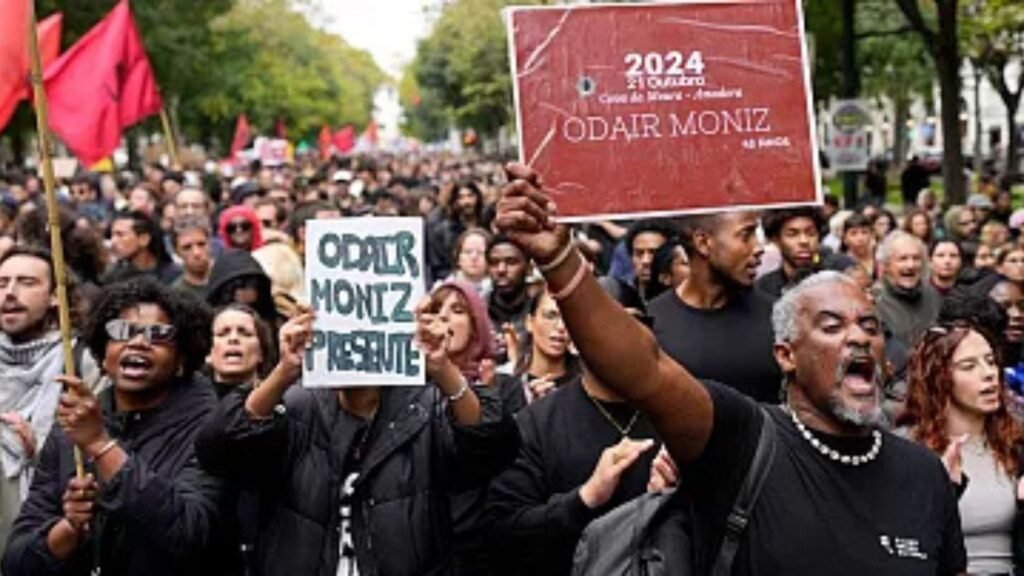The fatal shooting of Cape Verdean citizen Odair Moniz by PSP police officer in Cova da Moura in October has caused widespread anger and concern. The police have now transferred the officers involved in the incident. They said this was done to ensure their safety. This decision comes as investigations and public pressure continue to grow.
Read More About: Prime Minister Rejects Firefighter Pay Rise Demands After Tuesday Protest
PSP Transfers Officers Involved In Odair Moniz Shooting

The incident began with a police chase that ended with Moniz being fatally shot. According to the officer, there was a struggle between him and Moniz.
The officer admitted that Moniz did not try to attack him with a knife or any weapon. This statement was different from the PSP’s original report which claimed that Moniz had threatened the officer with a blade.
The officer who fired the gun now faces charges of simple homicide. Investigators are trying to understand what happened that led to that shooting.
The officer has given a statement to the PJ (Judicial Police). Because a magistrate was not present during his first questioning. He will need to be questioned again. The court has not set a date for a trial or further hearings.
This delay has caused frustration among Moniz’s family, activists, and public. Many feel the lack of progress is unfair and disrespectful to Moniz and his community.
The PSP has announced that both officers involved in the case have been transferred. One officer has already been moved to a different location.
The other officer who fired the fatal shot will also be transferred once he returns from psychological leave. He has been on leave since the shooting and has not resumed work.
The PSP said these transfers were made for security reasons. There has been significant public anger directed toward the officers and the transfers are seen as a way to avoid further tension. However the PSP has not disclosed where the officers have been sent due to concerns for their safety.
This action may reduce immediate risks for the officers but it does not address the deeper issues raised by the shooting. Many believe these measures are more about protecting the police force’s image than ensuring accountability.
Investigations And Political Action
The shooting has also drawn attention from politicians. Parliament has now approved a hearing with the Minister of Internal Affairs Margarida Blasco. MPs want clear answers about the incident, the PSP’s actions, and the riots that followed Moniz’s death.
Minister Blasco promised last month that the disciplinary process against the officer who shot Moniz will soon be completed. No outcome has been announced. Investigations by the PJ and the Inspectorate-General for Internal Administration (IGAI) are also ongoing with no clear timeline for their conclusion.
This lack of progress has led to public distrust in the system. People are questioning why it is taking so long to investigate the case. Activists and MPs are pushing for faster action and better communication from the authorities.
Riots After The Shooting
The shooting has increased anger and violence in Lisbon’s suburbs especially in Cova da Moura and surrounding areas. Riots erupted as people protested against the killing and demanded justice. Over 140 incidents were reported which include vandalism, burnt vehicles, and clashes with the police.
One of the most serious incidents happened in Loures. A Carris bus was set on fire and the driver suffered severe burns. He was trapped inside the bus and almost died from his injuries. This attack shocked the nation and highlighted the intensity of the unrest.
Two men of age 22 and 23 were arrested for the bus attack. They have been charged with attempted murder and remain in custody. Police believe six other people were involved in burning the bus and are continuing their investigations.
The riots did not end because of police intervention or community reconciliation. They stopped because the heavy police presence disrupted local drug trafficking operations.
Chief Superintendent Bastos Leitão who is a former head of the PSP’s Criminal Investigation Division explained the situation. He said the constant presence of police in the area made it difficult for drug dealers to carry out their business. Customers were afraid to approach and sales dropped.
He said:
The leaders of these criminal groups didn’t want the police around when they had to do their day-to-day business. The burnt-out buses and rubbish bins that forced the constant presence of the police spoilt their business. The perpetrators of these acts of violence were warned by the drug lords to stop hostilities with the same kind of argument: the extended police presence was dispersing buyers and drug sales.
Leitão compared this to similar events during riots in the Bela Vista neighborhood of Setúbal in 2011. In both cases gang leaders told people to stop causing trouble because the increased police activity was bad for their operations.
Demands For Justice
Activists and community leaders are demanding a transparent investigation and clear answers about what happened. They also want changes in how the police interact with marginalized communities.
Some believe this case should be a turning point for addressing systemic racism and improving relations between the police and the public.
Parliament’s decision to summon Minister Blasco is seen as a positive step. MPs hope the hearing will provide clarity on the case and push for faster action. However, many worry that delays and a lack of communication will continue to frustrate the public.
The PSP’s decision to transfer the officers involved may reduce immediate tensions but it does little to address the broader issues. The public wants justice for Moniz and assurances that such incidents will not happen again.
